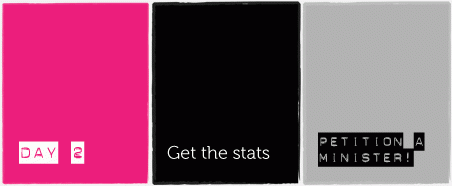
The known statistics on violence against women clearly indicate its pandemic proportion. The UN In-Depth Study on All Forms of Violence against Women found that at least one of three women around the world has been beaten, coerced into sex, or abused in her lifetime usually by someone known to her.
At the same time, comprehensive data-collection on incidents of violence against women is a challenge. Some governments don't see this as an important issue and don't prioritise it on the national agenda. Underreporting due to barriers which include poorly trained enforcement officers, lack of adequate laws and social sanctions such as "shame" make it virtually impossible for women and girls to report the violence they have faced without further risks or costs to their well-being.
We need statistics because they give us a sense of the extent of the problem. Well-developed statistics also help us to understand the different dimensions of violence to be able to come up with good responses. Without statistics like the one above, it might be easy to dismiss violence against women as one-off incidents, or that rapists are mostly strangers instead of people we know and trust.
We are only just beginning to pay attention to how ICT impact on violence against women. It's only in the past few years that cyberstalking became a known phenomenon, and that new information is being uncovered about how mobile phones can become important points of struggle and violence. We know this is a serious issue, and we know it needs to be addressed now.
But current data collection efforts rarely include cases like cyberstalking or the use of private photographs to blackmail partners into staying in an abusive relationship. Apart from a few high-profile cases involving celebrities and politicians, we have very little data on how the majority of women and girls in their everyday lives and relationships are affected. This is also one of the reasons why there are virtually no laws able to provide recognition and access to justice for survivors of such violence.
Get the stats! Recognise the issue. Petition your government to start collecting data on violence against women and ICT!
1) Locate
- Many governments are recognising the power of ICT to facilitate and improve their work. They usually have official websites, and some public officials even have blogs and Twitter accounts to reach the internet-connected sections of the public.
- Do a search and find out the contact details of the Ministry involved. For example, Ministry of Women, Ministry of Telecommunications, or even the Prime Minister or President's Office. Find their email address, blog address or Twitter account.
2) Petition
Send them a petition today! You can send an email, write a letter to the editor or even post a tweet!
- EMAIL
- Write an email that says something like:
Subject: Petition to include [cyberstalking, online harassment and privacy violation] in data collection on violence against women
Dear Minister
Violence against women is a serious problem in our country. With the increased development of the internet and mobile phones, violence against women is taking on new dimensions. As a person living in this country, I petition you to include incidences of [cyberstalking, online harassment and privacy violation etc] in current efforts to collect data on violence against women. Please raise it as an issue in the next parliamentary sitting.
Sincerely,
- Forward the email to 10 people and local mailing lists, and ask them to do the same.
- Send a copy of your email to ideas@takebackthetech.net, and we will post it up as part of the global collective effort to improve data collection on cases involving violence against women and ICTS
- LETTER TO THE EDITOR
- Write an open letter to your minister, and address it as a letter to the editor of the most popular newspaper where you are.
- Add a personal story, experience or recent event to ground the point. Use any of the content raised above to get you started.
- Send a copy of the letter to ideas@takebackthetech.net, and we'll post it up here.
- TWEET
- If your Minister has a Twitter account, "follow" her/him. Make full use of this platform to engage with your representative in government.
- Send her/him a Tweet something like "Start collecting stats on cyberstalking etc. Pls raise in Parliament."
- Tag it as #takebackthetech, and add a call for your network to retweet the msg at the end. Your tweets will be published on the right column of this site if your account is public.
- If your Twitter account is private, you don't have to accept your Minister's request to "follow" you. You can still send tweets to them and they'll see it.
Take Back The Tech! Get the stats. Make the connection between ICT and violence against women visible. Turn the tide!
- Log in to post comments
